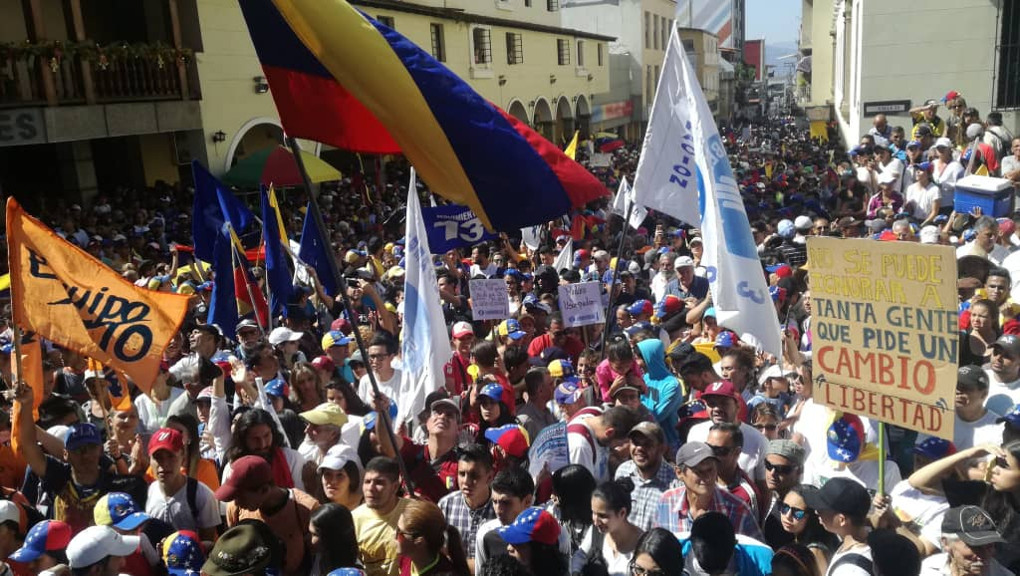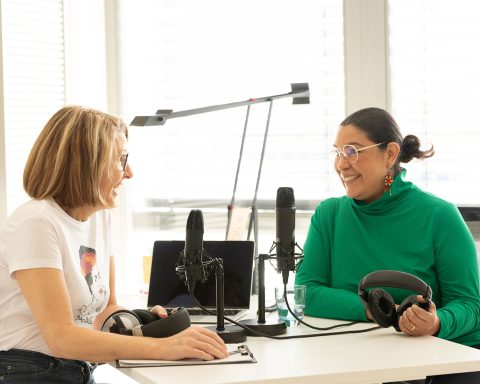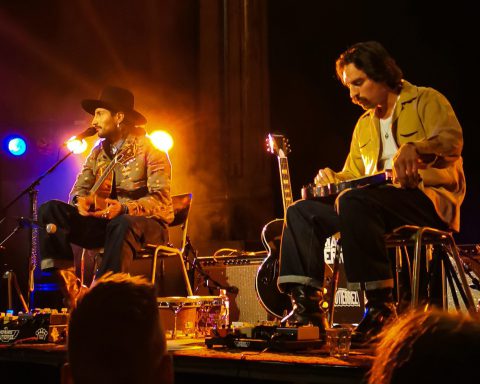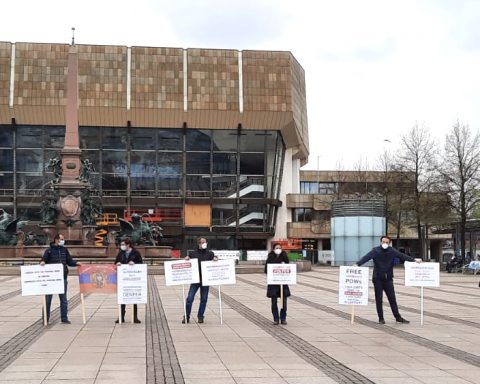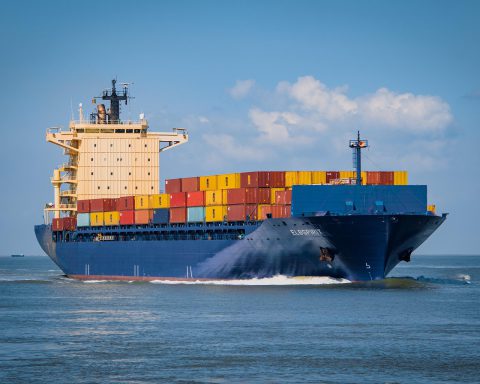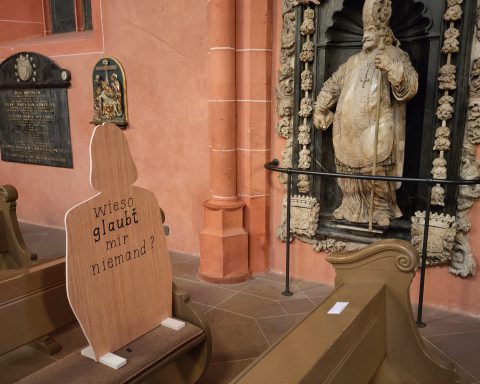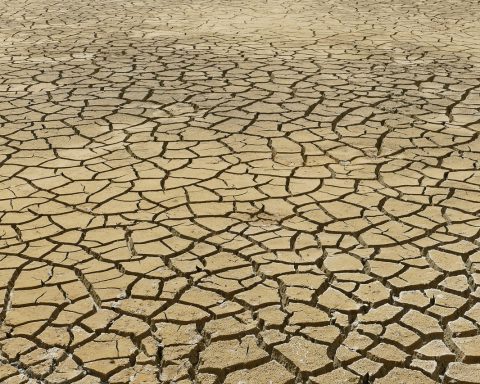- First, Venezuela’s economic context: It’s more than just bad.
- Second, the political context: The last presidential “elections” were rigged.
- There was even a Venezuelan demonstration in Leipzig!
- Over 20 countries have recognized Guaidó as the legitimate leader of Venezuela, and Europe is about to follow suit.
Last Wednesday, the 23rd of January, was a historic day for Venezuela and Latin America. Venezuelans rejected Nicolas Maduro and his government all over the country and abroad, as they rallied in public spaces to protest his now de facto presidency.
Maduro’s term in office expired earlier, on the 10th of January The opposition-controlled parliament had called for mass demonstrations a few days before, which created momentum for the speaker of the assembly, 35-year-old Juan Guaidó, to take charge of executive power as interim president of Venezuela.
Many still don’t understand the events of that day and those that followed, largely because Venezuela is a country that defies simple explanation. It is a country where people with brand new SUVs queue for practically free gasoline and where there are critical shortages of food and medicine, even if it has the largest proven oil reserves in the world. So here is a bit of the basic context and facts of what happened.
First, Venezuela’s economic context: It’s more than just bad.
Over one million percent inflation. A drop in gross domestic product of over 18 percent between 2017 and 2018. Nosediving oil production, which accounts for pretty much every dollar that enters the country. These are like the economic indicators of a war-torn country, although Venezuela has not experienced a war of any kind since the 19th century.
The economics of how a country can collapse so magnificently are indeed complex, but the political causes are rather easy to trace: It’s all about a so-called socialist government in cahoots with the military that refuses – and is to a large extent unable – to reform the economy in any way, as doing so would sever the governmental and military elite from extremely lucrative income sources.
During these last several years of economic crisis, the top Venezuelan military brass and governmental leaders like Maduro have and will continue to do all they can to hold on to power, which gives them access to luxurious villas, private jets, and 18-year-old scotch. (Because of the economic crisis, they had to forgo 21-year-old scotch, the poor souls!)
However, Venezuelans that are not connected, as is referred to in Venezuela, to the top echelons of power, have seen no recourse other than to leave the country. In fact, over 3 million Venezuelans, possibly even 4 million, have done just that. This is a staggering number when one considers that the country’s population is about 33 million.
Second, the political context: The last presidential “elections” were rigged.
Venezuela held elections in May 2018 that weren’t recognized by the international community, except by exemplary democracies like Russia, Turkey, China, Nicaragua, and Cuba. The reason was that, among many other electoral dirty tricks, the Maduro government – which controls all institutions in Venezuela except parliament – banned major opposition parties and political leaders. Many political leaders were jailed or forced into exile. The European Union joined the international community in not recognizing the sham elections.
Such “elections” took place about eight months before Maduro’s presidential term was due to expire, as per the Venezuelan constitution, on January 10th, 2019. Since then, Venezuela ceased having an elected president, as the country did not choose a new president as the constitution requires, you know… democratically! Therefore, per articles 233 and 333 of the Venezuelan Constitution, the speaker of the National Assembly, Venezuela’s parliament, must take over as caretaker President of the Republic until new free and fair elections take place.
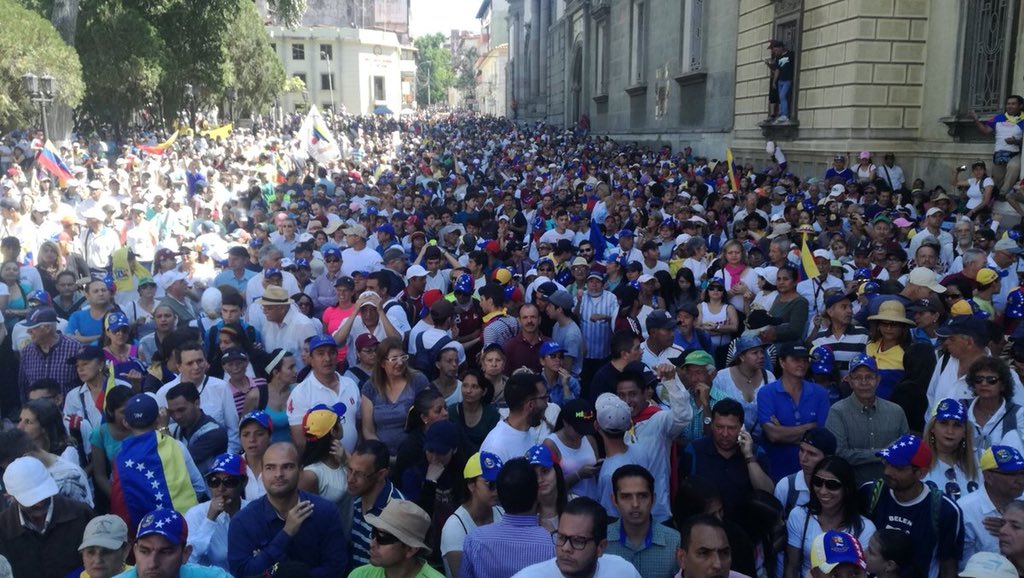
And this is where Juan Guaidó and the protests of January 23rd come in.
This very young Venezuelan politician, who got into politics as a student leader protesting attacks on freedom of expression, lack of university autonomy, and expanded presidential powers by the late Hugo Chavez in the mid-2000s, now seeks to lead a transitional government that can hold free and fair elections. Doing that is not easy, since the Maduro government still has the most important player in Venezuelan politics on his side, the military. Therefore, Guaidó knew that he needed to show people, especially abroad, that the popular will is not on Maduro’s side, just the green-clothed thugs with guns. What better way to do that than with massive protests.
On January 23 Venezuelans in Venezuela and abroad answered Speaker Guaidó’s call for mass protests. The choosing of the date was not random, on that day in 1958 a previous military regime collapsed, allowing for free and fair elections to take place in Venezuela. So the speaker was appealing to powerful historical symbols in Venezuelan history to persuade people to protest in mass, and it worked.
Venezuelans all over the country went out to protest. Due to the fact that ten percent of the population has left in the last few years to seek a better life, Venezuelans gathered to protests in many other countries of the world.
There was even a Venezuelan demonstration in Leipzig!
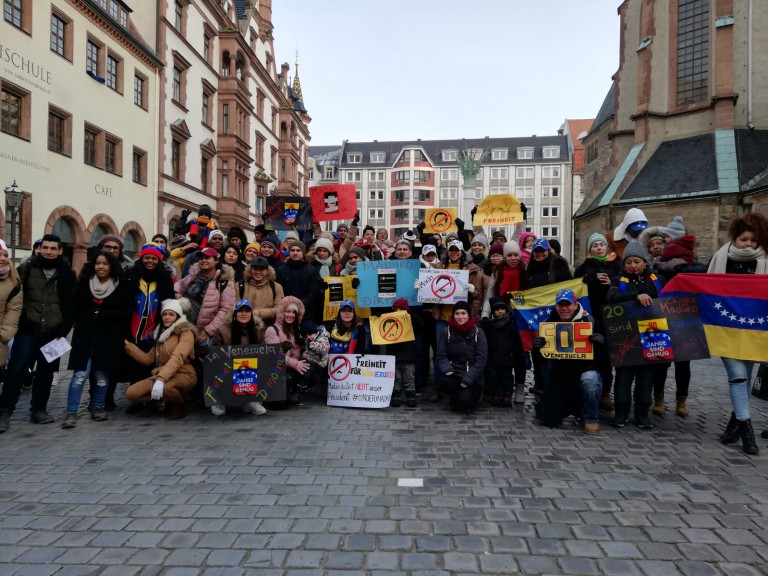
According to Maria Virginia Manzanilla, who participated in the Leipzig gathering:
About 40 Venezuelans attended. Many of them knew each other from the asylum home near Leipzig that houses most Venezuelans applying for political asylum in Germany.
She added: “There was a very nice and amicable atmosphere, and some Germans approached us to ask about what we were doing and the situation in Venezuela.”
Over 20 countries have recognized Guaidó as the legitimate leader of Venezuela, and Europe is about to follow suit.
The German government, along with the main countries of the European Union, gave an ultimatum last Saturday that Maduro must call fresh free and fair elections, allowing international observers, until next weekend. If he fails to do so, Germany and the EU will formally recognize Guaidó as the legitimate interim president of Venezuela.
Already most of Latin America has recognized Guaidó as the legitimate leader of Venezuela, as well as the United States and Canada. Recognition by the US has been particularly helpful, since that is where most of the Maduro clique have their assets – which puts a lot of pressure on the regime. Yes, Venezuela’s so-called socialist government loves to loathe on the American Empire, but who can resist enjoying a billion dollars of embezzled money in Miami Beach?

